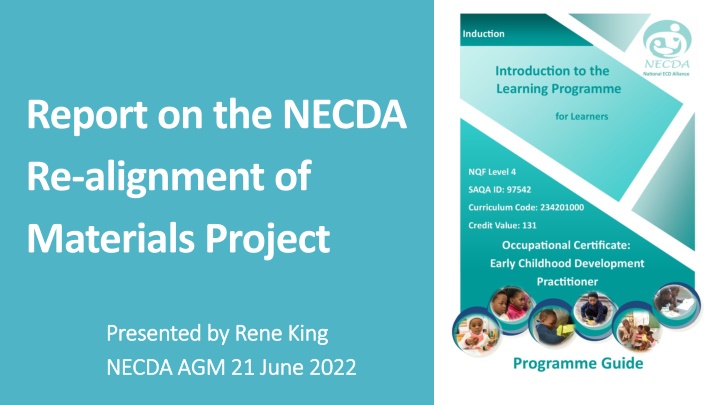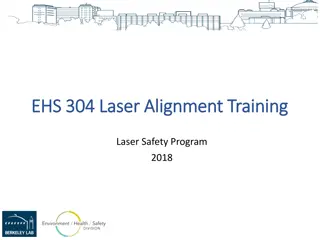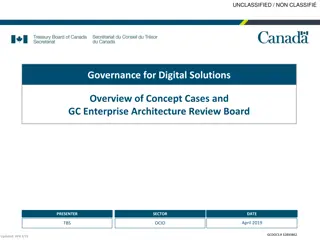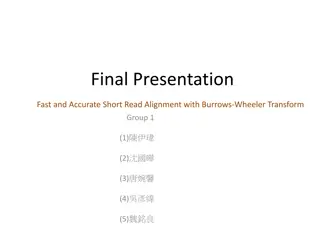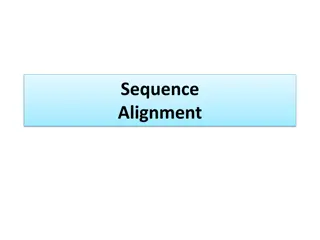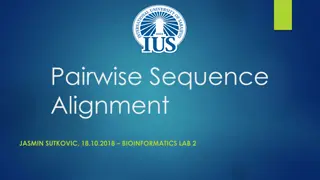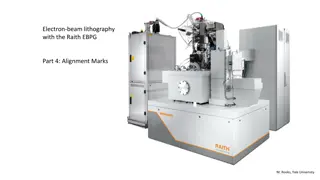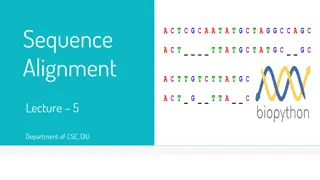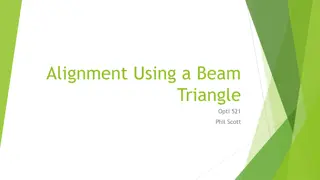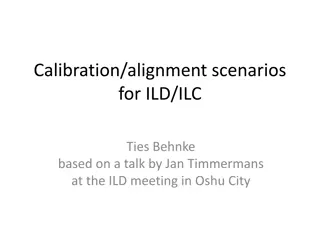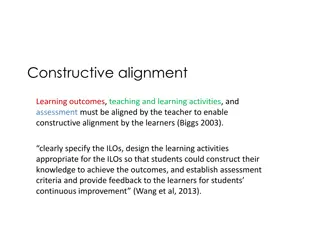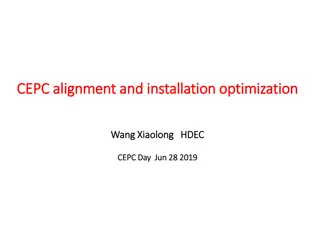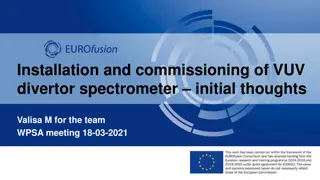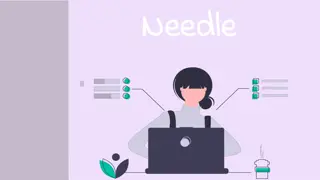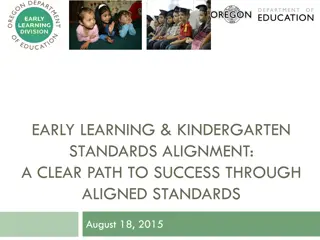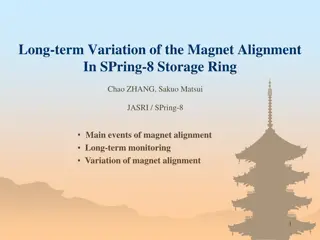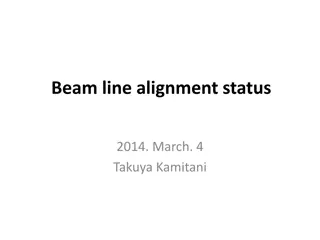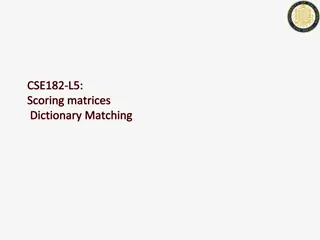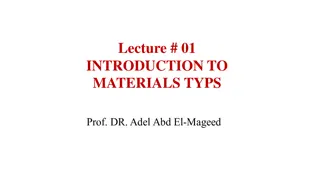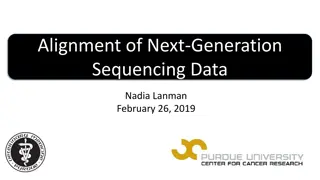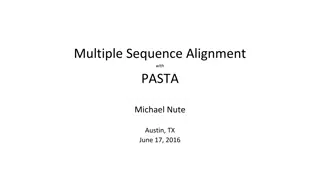NECDA Re-Alignment of Materials Project Report
NECDA initiated the development of materials for ECD practitioners, partnering with ETDP SETA. After the legacy qualification expiration in 2023, NECDA raised funds to realign old Level 4 materials with the new QCTO qualification. A meeting was held in September 2018 to strategize on reorganizing content to meet updated requirements.
Download Presentation

Please find below an Image/Link to download the presentation.
The content on the website is provided AS IS for your information and personal use only. It may not be sold, licensed, or shared on other websites without obtaining consent from the author.If you encounter any issues during the download, it is possible that the publisher has removed the file from their server.
You are allowed to download the files provided on this website for personal or commercial use, subject to the condition that they are used lawfully. All files are the property of their respective owners.
The content on the website is provided AS IS for your information and personal use only. It may not be sold, licensed, or shared on other websites without obtaining consent from the author.
E N D
Presentation Transcript
Report on the NECDA Re-alignment of Materials Project Presented by Rene King Presented by Rene King NECDA AGM 21 June 2022 NECDA AGM 21 June 2022
Background During the period 2008 to 2012, NECDA undertook the initiative to develop materials for the newly registered ETDP SETA s Further Education and Training Certificate in ECD Level 4 materials (Qualification ID 58761) These materials, which drew very heavily on materials so generously submitted by Ntataise, ELRU, Tree, Khululeka and the CECD, were developed specifically for use by network members for the training and development of ECD practitioners A special partnership agreement was entered into with the ETQA / ETDP SETA, who recognised them to be of a high standard and which expedited the process of Learning Programme Evaluation Approximately 30 NECDA members have signed a MoU with NECDA over the last 10 years for the use of the materials
NECDA has maintained a quality control system for the use of the materials, their distribution as well as the Training of Trainers. The legacy ETDP SETA FETC in ECD was replaced by a new QCTO ECD Practitioner Qualification in 2017. The legacy qualification expires in 2023 with the final teach-out period being 2027 At an AGM in June 2018, NECDA Members endorsed the Alliance Board s proposal to raise the necessary funds to undertake the task of realignment of the old Level 4 materials and the development of materials for the new QCTO qualification A proposal was submitted to the Jim Joel Fund and R549 124.00 was raised in July 2018 in support of this endeavor. A call for financial contributions towards this project were put out to members and an additional R90 000.00 was raised.
Launching the Project: Meeting in Port Elizabeth September 2018 To familiarise ourselves thoroughly with the principles and requirements embedded in the Policy on Minimum Requirements for Programmes Leading to Qualifications in Higher Education in Early Childhood Care and Education (Birth Four) for Educators and Practitioners, the Comprehensive Quality ECD Programme, the Essential Package proposed in the National Integrated ECD Policy (December 2015) and all other national policy documents relevant to ECD. How to begin to re-organise the Unit Standards-based topics/content from Qualification 58761, with the requirements for the Knowledge, Practical Skills and Work Experience Modules of the ECD Practitioner Occupational Qualification 97542. The need to expand the content on NELDS (for Birth to 4 years), the National Curriculum Framework as well as increase coverage on the First Thousand Days , the Essential Package of ECD Services , inclusion and barriers to learning. We had to take serious cogniscance of the Level Descriptors for the QCTO ECD Level 4 Vocational Qualification
To draw on the materials recently developed by the Ntataise Network as well as those submitted by Early Inspiration. Amendments and adaptations which have arisen from the extensive use of the existing materials by NECDA members. To ensure that a richer and an even more relevant set of learning materials based on the practical, grass-roots experiences and needs of the ECD field, will be produced. In principle it was agreed to use supplementary materials as part of the Learner Support Materials package to avoid duplication and re-writing of materials that are available and of a high standard. That content be minimized, language simplified, administrative and marking requirements reduced, terminology standardised and practicability considered. We also needed to ensure that all ECD settings, namely centre and non-centre based programmes, were fully represented as well as all age cohorts. It was agreed that facilitators guides would be non-prescriptive and sufficiently flexible to allow for different levels of experience of facilitators as well as the needs of any particular group of ECD practitioners on training.
Project Team: Rene King (Management, Oversight, Editing and Quality Assurance) Lauren Stretch (Curriculum Development and Assessment) Early Inspiration Elly Kew and Barbara Valentine (Curriculum and Resources Development) - ITEC Lizanne Hudson and Arpana Pal (Design and Format) - Khululeka Carrol Warmberg (Financial Management) - ITEC Additional Materials Developers were brought on board as and when required.
It was decided that the materials would be standardized for each module and consist of: Practitioners Guide (Covering the Theory and Content)
Knowledge Workbook (Includes tasks, activities and reflections which consolidate and test knowledge acquired)
Practical Skills Workbook (Includes a variety of tasks and activities to practice skills in a simulated setting)
Work Experience Logbook (Includes tasks to be done on-site and to be signed off by an Assessor)
Practitioners Test Book (Includes tests for each module in preparation for external exam)
Facilitators Guide (Includes a Guide with Marking Memorandums and Training Aids. A Slide Presentation for each training session accompanies the guide with all the required videos included)
Introduction to the Learning Programme Guide (Includes all administrative requirements, matrices and processes of delivery for Service Providers and for Learners)
Achievements Year 1 July 2018 June 2019 The NECDA Board set up the parameters for the Project Appointment of Curriculum and Resource Developers Launched the Project and developed a Scope of Work First draft of Knowledge Modules 1-4 Practitioners Guides and Knowledge Workbooks/Internal Assessment Tools with a focus on re- alignment
Achievements in Year 2: July 2019 June 2020 Secured a second Grant from the Jim Joel Fund First draft of Knowledge Modules 5- 7 Practitioners Guides and Knowledge Workbooks/Assessment Strategies Meeting with the QCTO Consultative Workshop with Trainers for review of materials developed to date Suspension of the Project due to the COVID Pandemic during Level 4 and 5 Lockdown periods
Achievements in Year 3: July 2020 June 2021 Secured a third Grant from Jim Joel Fund Intermittent activity due to COVID (June 2020 Dec 2021) 2nddraft of all Knowledge Practitioners Guides and Knowledge Workbooks (Knowledge) 1stdraft of Practical Skills Workbooks for Modules 1 -4 1st draft of Work Experience Logbook 1stdraft of Facilitators Guides and Marking Memorandums for Modules 1 and 2 including Training Aids Development of the Child Observation and Assessment Record Books (Aligned with the NCF) Intermittent activity due to COVID (June 2020 Dec 2021)
Achievements in Year 4: June 2021 June 2022 Final editing, formatting and quality assurance of all 7 Knowledge Modules Practitioners Guides Final editing, formatting and quality assurance of Knowledge Workbooks, Practical Skills Workbooks and Facilitators Guides for Modules 1 -3 Final compilation of Knowledge Workbooks, Practical Skills Workbooks and Facilitators Guides for Modules 4 7 Final editing, formatting and quality assurance of Work Experience Logbook Preparation for the Training of Trainers on the use of the materials
Preparation for Training of Trainers: Development of an Introduction to the Learning Programme for Service Providers QCTO Application for Accreditation Requirements and Processes Introduction to Materials Workshop
Outstanding Work: July September 2021 Final editing, quality assurance and formatting Practitioners Workbooks, Facilitators Guides and Slide Presentations for Modules 4 7 Training of Trainers Workshops Establishment of Administrative System and Materials Storage Feedback Reflection Cycles
Challenges and Stumbling Blocks A significant underestimation of the scope of work It was not after all a re-alignment process but rather the development of a whole new approach to teaching and learning Design and structure of the Qualifications Repetition, Sequencing, Flow of Topics, Assessment Criteria etc Very slow progress and loss of momentum Impact of COVID (Suspension of work for months at a time) The cyclical nature of the task at hand (reliance on team members to complete a task in order for another to continue with their own tasks)
The sporadic availability of team members not only in terms of their other work commitments but also personal circumstances The need to standardise materials written by different team members (style, tone, language usage etc) The need to revisit and refine Modules to ensure increased integration, continuity as well as scaffolding and the graduated complexity of tasks Review of all the materials and the need to embed the NCF further across all Modules Revisit Assessment Activities to ensure Practitioner readiness for the EISA Repetition of tasks e.g. proofreading and reformatting Quarterly reallocation of tasks according to issues emerging, concerns, consolidation etc Issue of Foundational Learning in Communication and Numeracy was grappled with endlessly
NECDA will host 3 virtual workshops in the next quarter for Members interested in using the materials: An Introduction to the Learning Programme for Service Providers QCTO Application for Accreditation requirements and Processes Introduction to the Materials Workshop
Unique Features of the Materials Fully integrated in terms of the Structure of the Qualification Grounded in an emphasis on the importance of play-based learning Self-reflective practice has been embedded in the Learning Programme Raised the bar in terms of standards for the training of ECD Practitioners Members will have all that they require in order to offer the Qualification but will need to consider very carefully whether or not to do so
Modules build one upon the another, strengthening and extending knowledge, application and implementation capacity Fully up to date with National Policies and Legislation, Frameworks etc Tools, templates and extra resource have been developed e.g. Planning Books There are recommendations for additional resources and supplementary materials to enrich the learning experience Successful graduates will be better able to navigate and manage the demands of further professional development and training in ECD than they would have after the Legacy Qualification
Grateful thanks to all those who have contributed to what I believe is an outstanding body of work and to the NECDA Board for their oversight and support
